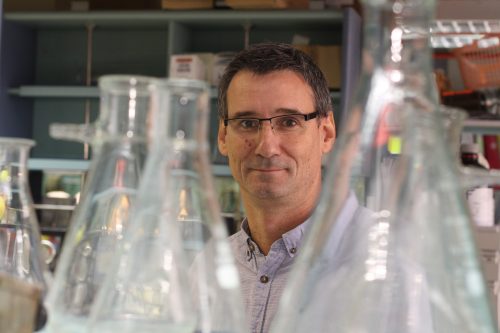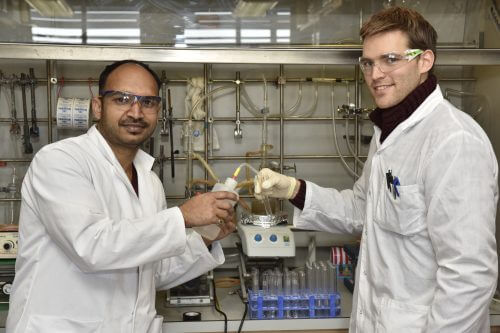The journal Nature Communications reports on the success of Technion researchers in creating new "reaction sites" in organic molecules

Researchers at the Shulich Faculty of Chemistry at the Technion succeeded in creating new reaction sites in organic molecules, for the first time through the remote transfer of information between two ends of the molecule. The article published in the journal Nature Communications is signed by the head of the laboratory, Prof. Ilan Mark, Sukdev Sina (postdoctoral student from India), Jeffrey Broperts (doctoral student from Belgium) and Alexander Vasseur (postdoctoral student from France).
Organic chemistry is a very broad field that includes most of the biological molecules on which all the flora and fauna are based, most of the drugs, synthetic polymers and more. One of the main challenges in this context is the development of new synthetic methods - a field that has already won a number of leading researchers Nobel Prizes. "You can say that we are architects of molecules," explains Prof. Mark, "and just as there are architects who prefer the standard and there are those who look for the different, in chemistry too there are those who build standard molecules and there are scientists like me who look for the different and the challenging. I am particularly attracted to challenges in synthesis that are considered impossible to achieve."
Indeed, in the current study, Prof. Mark's research group cracked a challenge that was considered impossible: the creation of a new reaction site in a place where there was no such position. The reaction site - "functional group" in its professional name - is the gateway of the molecule to react with other molecules and hence its importance. In the current article, Prof. Mark demonstrates the creation of such a group through "remote functionalization" (remote functionalization based on the transfer of information on a metal within the molecule.

"The idea of remote functionalization was already proposed a few decades ago," explains Prof. Marek, "but so far it has not been applied in the field of organic synthesis. This is because the remote effect is based on the migration of a metal in a molecule, and this migration is limited by various constraints and it was not clear how to control it and direct it to a specific site." Now, as mentioned, the group succeeded in transferring information from the site of the original location of the functional group to another point, very far away, in the molecule. This transfer is carried out in a single process (one-pot operation) and regardless of the molecular distance between the two sites. In fact, it is a kind of "pole jump" that transfers the information and produces a new functional group in the molecule.
In the last two decades, dramatic progress has been achieved in the field of organic synthesis. If in the past the scientific community in this field focused on the effort to create covalent bonds of the standard type, then in recent years a paradigm shift has been taking place towards flexible, economical and multi-purpose systems. Therefore, the success of the technical research group in developing an efficient process of remote functionalization may lead to far-reaching applications, for example in the pharmaceutical industry.
Prof. Ilan Mark was born in Israel but moved to France with his family at the age of one. In 1988 he completed a doctorate at the Pierre et Marie Curie University in Paris, and after a post-doctorate in Belgium he worked as a researcher at the Pierre et Marie Curie University. In 1997, after 34 years in France, he returned to Israel and joined the Faculty of Chemistry at the Technion. Today he heads the Malech Family Organic Chemistry Laboratory and holds the Sobel Chair. Prof. Mark has won many awards including the Weizmann Prize for Exact Sciences, the Excellence Award of the Israel Chemical Society, the Alon Scholarship, the Michael Bruno Award, the Taub Award for Academic Excellence and awards for teaching excellence including the Yanai Award from the Technion.
